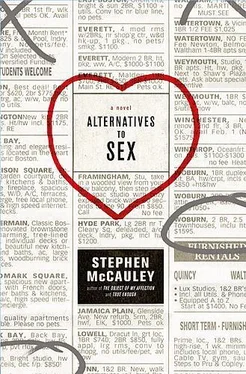“There’s room for one more,” Samuel said, lifting up his huge umbrella a little higher.
I’m usually too proud to accept generosity from men, especially if they’re handsome, but in this case, doing battle with a cheap accouterment seemed the more emasculating position, so I tossed my umbrella into a trash barrel, mumbling something about it being a useless piece of garbage, and stepped under theirs.
It was awkward, walking up the street like that, bumping against one another, each of us getting wet in a different place, but I liked the feeling of being between them, hovering slightly above both, protected by their umbrella and, for the length of time it took to walk four blocks, a part of their lives, even if an insignificant part.
As we were passing the Nut House, Samuel smiled at Charlotte, more confirmation, I thought, that they’d just spent fifty minutes there. Because Charlotte had already brought up drugs, depression, and suicidal longings, it didn’t seem wildly inappropriate to ask if they had a counselor there, but remembering how offended “Carlo” had been by my vacation question the night before, I attempted a bit of discretion.
“Nice building, isn’t it?” I said. “I used to go there to see a shrink, not that I needed one.”
“We went there for the same reason,” Charlotte said. “We fired our counselor this morning. She kept trying to make us change the things that aren’t working in our marriage. I mean, if it was that easy, why would we have been there in the first place?”
“They always want you to change,” I said. “It’s depressing.”
Almost everyone I knew, with the exception of Edward, was in or had been in therapy at some point in his life, ostensibly to solve his problems. But for some, going into therapy was a costly but effective way to settle into a holding pattern until they’d figured out an airtight rationalization for clinging to their neuroses and counterproductive habits. After all, there’s room for only so many geniuses and prodigies in the world. For the rest of us, our best shot at individuality comes in the form of unique character flaws and neurotic patterns.
“What really happened,” Samuel said, “was that she, the counselor, finally got me, the husband, to see that Charlotte, the wife, had a point about getting an apartment in town. As soon as we settled that, Charlotte decided we didn’t need her anymore.”
“It was generous of you to go along with the idea,” I said.
He shrugged. “I was outnumbered. I had no choice.”
Like most men, it seemed, he took a completely passive attitude toward his marriage and let his wife figure out what was required to keep it together.
I knew the apartment was wrong for them as soon as we walked in. I’d written the description based on information the owner of Cambridge Properties had given me without ever having visited it, but I saw now that despite its attractive layout, much of the character and style had been sanded, painted, and Home Depot’d into bland facelessness. Everything in the place was depressingly new and functional. It was perfect for the customers I thought of as Dishwasher People.
There are customers who want a living space that fits in with their lives, their taste, and their aesthetic sense of balance and proportion, and then there are the people who want a dishwasher. In the former category, there are people who walk into an apartment or a house and pay attention to the height of the ceilings, the exposure of the windows, the way the rooms flow one into the other, the width of the floorboards. In the latter category are the people who ask: “Is there a dishwasher?” and then, if the answer is yes, plop down a deposit. The former group looks for a place that will be a good staging ground for the drama of their lives, the latter looks for the location of the cable hookup. Oddly enough, I had the impression that most Dishwasher People didn’t really care all that much about a dishwasher. They just felt obliged to show interest in some concrete detail, so they wouldn’t appear to be an easy target for avaricious sellers or landlords. I doubt many Dishwasher People ever use dishwashers since they tend to be the workaholic sort who rarely spend more than two waking hours at home and subsist on frozen dinners you can eat out of the packaging.
Technically, I’m a Dishwasher Person manqué. That is, I checked first to see if my house had a dishwasher and cable hookup, and when I saw it didn’t, I bought it anyway.
Charlotte and Samuel entered the apartment with the tentative silence that often overcomes people when they first start looking at real estate. The couple that owned the apartment had equipped it with the kind of nondescript, supposedly tasteful furniture and artwork (some of which could be found at my house) that constitutes an erasure of all taste. They’d outfitted the living room with a sleek rowing machine and exercise bike, conveniently facing the very big television set.
“The furniture is all going,” I said, watching Charlotte sink into an immense slipcovered chair that bore no relation to any of the other furniture in the room.
“I suppose the walls and ceilings and floors stay,” she said.
Sam had his hands in the pockets of his raincoat. “Recently painted. And very clean.”
“He’s the glass-half-full part of the pair,” Charlotte told me. “Also the cook,” she explained as he went looking for the kitchen. She picked up a big, brightly painted balsa wood sculpture of a bird, one of those individual works of art that are imported from Mexico in the tens of thousands. “I hadn’t thought about it before, but in your job, you get to peek into people’s lives directly, more so than a shrink even. They have to wade through annotations and outright lies, while you see the inside of the medicine cabinets.”
“I never pry,” I said. “I’m scrupulously discreet.”
“I don’t believe you.” And then, pouting, she said, “I’m dying to open this and see what’s inside.” She touched the handle on a small cabinet beside her chair. “You wouldn’t mind, would you?”
“Go right ahead.”
Charlotte was delighted with the contents: a stack of TV Guide s, a large box of cheap, chocolate-covered almonds, and two cartons of cigarettes. “All the things about themselves they don’t want us to know,” she said. “Do you think there are pictures of them anywhere?”
“I’m sure there are. Everyone has pictures, even though it seems easier to me just to look in a mirror. Should we go explore?”
“If I can pry myself out of this chair.”
In the course of our conversation, she’d arranged herself in the big chair in a provocative manner with her coat falling open and her legs crossed at the knee in a way that drew attention to their shapeliness. She was wearing a pair of dark shoes with thin heels that accentuated her calves. I wasn’t at all conflicted about my (homo)sexuality, but I enjoyed looking at women’s bodies, almost as much as I enjoyed looking at men’s. Sometimes more, since there was no envy, angst, or lurid desire to possess or to be the other.
I was about to compliment her appearance in the fatuous, automatic way I sometimes have when Samuel’s cell phone went off in the other room, and he began a quiet conversation. Charlotte cocked her head and played with the loose strands of her hair while trying to overhear what he was saying without being too obvious about it.
“A business call?” I asked.
“It could be. Or it could be his mistress.” She turned to me and opened her dark, tired eyes wide, as if to say: What do you make of that? Am I shocking you?
“Oh? Does he have one?”
“You never know. I’ve been encouraging him to get one for some time now.”
Читать дальше












